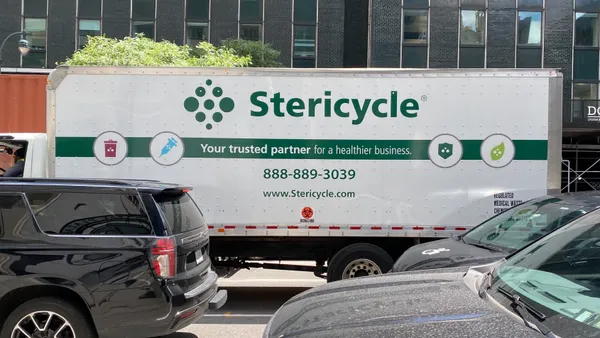UPDATE: June 19, 2020: Florida Gov. Ron DeSantis signed HB 73 into law yesterday, following recent final approval from the state's top legislative officers and unanimous passage in both chambers earlier this year.
Dive Brief:
- Last week, the Florida House of Representatives unanimously passed a bill (HB 73) listing contamination-related details that must be included in recycling contracts between municipalities and haulers or MRFs. Haulers would not be required to transport contaminated materials that violate the definition of acceptable recyclables, and MRFs would not be required to process them.
- The contracts would have to state a definition of "contamination" appropriate for that community; the obligations of the municipality and the hauler or MRF in reducing contaminated material collection or processing; procedures for identifying, documenting and rejecting contaminated material; and which educational programs would be implemented to reduce contamination.
- This is the third time such legislation has been introduced in Florida in the past two years. Previous versions were vetoed by two separate governors due to objections over amendments. This version has no such amendments and is expected to pass the Florida Senate and be signed into law by Gov. Ron DeSantis.
Dive Insight:
The Florida contamination bill would be the only one of its kind in the country, according to sources, and has been more contentious than expected for often unrelated reasons.
The first version of the bill, passed in 2018, was vetoed by former Gov. Rick Scott because it was attached to a wastewater reuse measure that some opponents unappealingly dubbed the "poopy water" bill. The contamination bill was resurrected and passed again last year, but Gov. Ron De Santis vetoed it because a preemption amendment was added that would stop municipalities from implementing plastic straw bans.
Florida legislators tend to tack on unrelated amendments to bills because they are limited in how many individual pieces of legislation they are allowed to file, explained Keyna Cory, president of Public Affairs Consultants and lobbyist for the National Waste and Recycling Association (NWRA). This time, legislators agreed to address the recycling bill without adding controversial amendments that would risk another veto.
"I was so happy... to finally have bipartisan support, and that people realize the importance of recycling and that contamination is a huge problem," Cory told Waste Dive. "We believe the bill is going to help both the recyclers and the local governments come up with a plan on how to address contamination... It's time for people to get real about recycling and what's good for the community."
The Recycling Partnership (TRP) took issue with some of the legislation's original language regarding markets and potentially disposing contaminated materials. TRP does not oppose the measure as amended, but is not offering support for it.
"This bill is significantly better than it used to be... It strengthens the autonomy of communities in the contracting process," Elizabeth Biser, TRP's vice president of public affairs, told Waste Dive.
Still, the organization questions why Florida legislators felt the need for this type of measure.
"It's a very unique bill. It made us wonder from [the] very beginning why the bill was necessary. In the end, it's helping to set the contract relationship between MRFs and communities at a pretty good level," said Scott Mouw, senior director of strategy and research at TRP.
Cory pointed out the bill says communities, haulers and MRFs have to address the listed issues, but they do not necessarily have to go forward with all of them. For example, discussing education options might lead both parties to agree not to implement certain requirements and then write that stipulation into the contract. The legislation's goal is to get all local parties talking to each other and working together to tackle the contamination problem without the state dictating across-the-board specifics, such as a universal recycling definition or mandatory educational programs.
"We've got to be partners with our local governments in addressing contamination. It's not one local government's fault, and it's not a hauler's fault. It's got to be part of a team effort to make this work," Cory said.
Although the bill aims to improve bale quality, it holds the potential for haulers and MRFs to reject more materials due to perceived contamination. There is the possibility that disagreements could arise between municipalities and haulers or MRFs if gray areas exist in contracts about exactly what constitutes unacceptable material.
"[The bill] makes it even more important that municipalities are paying close attention to the contracting process," Biser said.
If HB 73 becomes law, it will take effect in October for all new or renegotiated recycling contracts. Cost pressures have been an ongoing challenge for Florida recycling programs recently, with further contract discussions expected in the year ahead.










